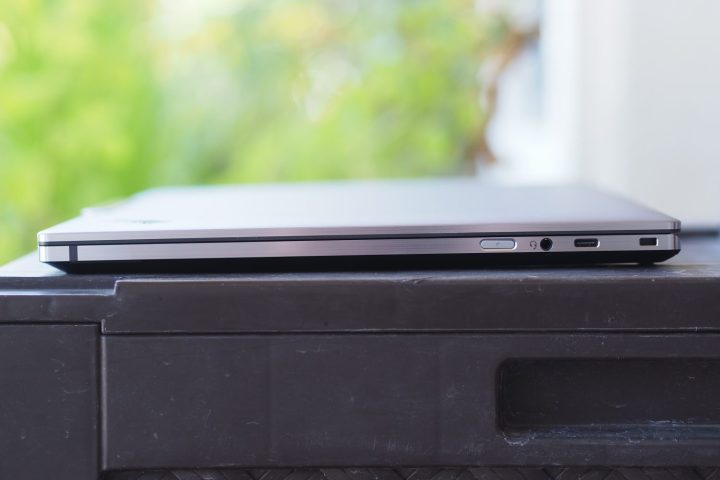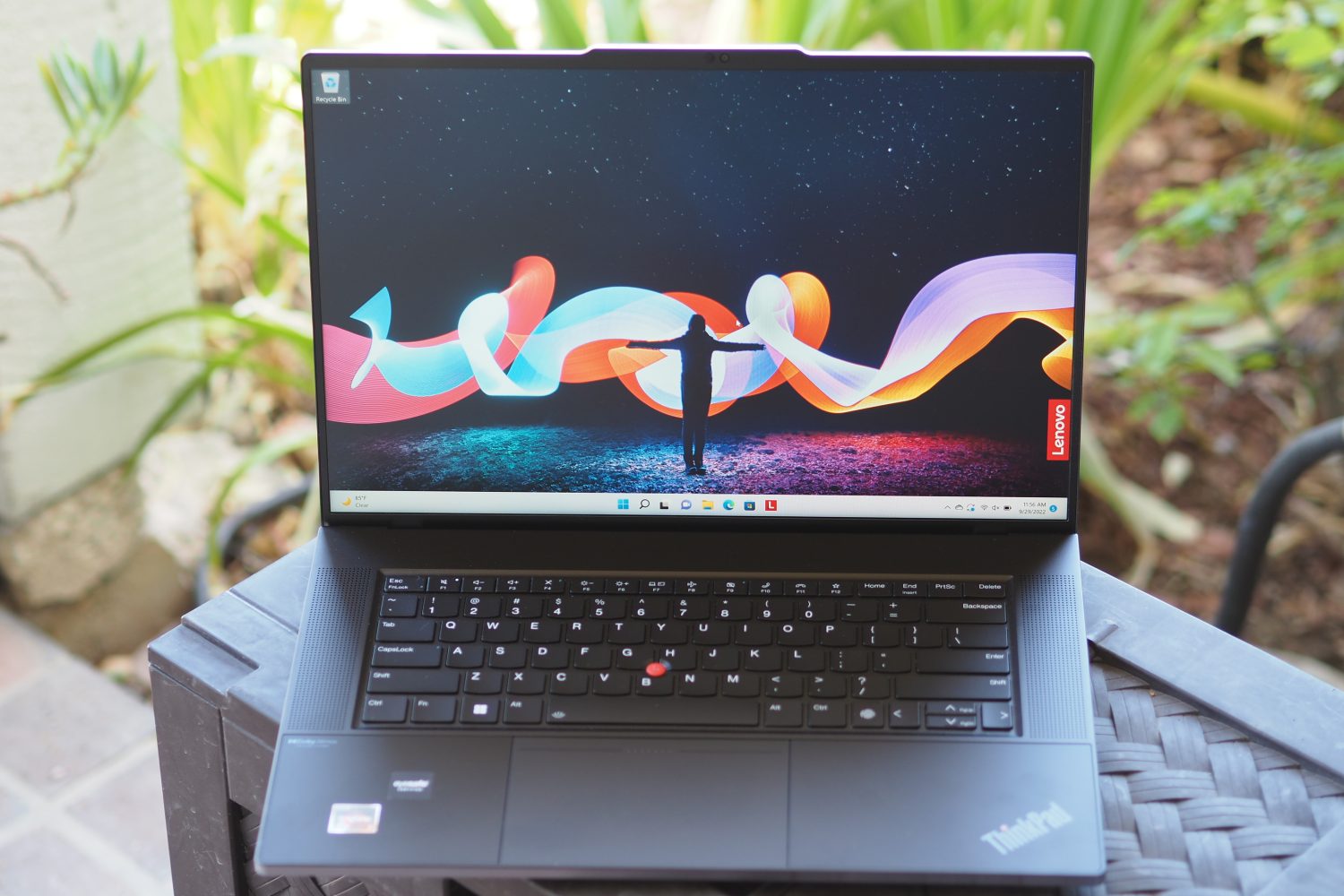
Lenovo ThinkPad Z16
MSRP $2,250.00
“The Lenovo ThinkPad Z16 is fast and long-lasting, with a unique leather look.”
Pros
- Solid and attractive build
- Excellent performance
- Long battery life
- Outstanding keyboard and touchpad
- ThinkPad-level security
Cons
- Expensive
- Limited port selection
Lenovo enjoys owning one of the most iconic laptop brands in the ThinkPad line of business-oriented machines. Holdovers from IBM, ThinkPads are typically recognizable from across the room thanks to a black-on-black aesthetic with carefully placed red accents. There have been exceptions, such as the ThinkPad X1 Titanium Yoga which sports a silver chassis, but otherwise, Lenovo has maintained the ThinkPad as a distinct brand.
The new ThinkPad Z laptops represent a more significant departure. The ThinkPad Z16, which I’m reviewing here, looks a lot more like a Dell XPS 15 with the lid closed than it does the ThinkPad X1 Extreme. Open it and you’ll find more of a ThinkPad-like keyboard deck, but what stands out most about the machine isn’t visible — it’s Lenovo’s focus on using sustainable materials. The ThinkPad Z16 finds a way to remain a ThinkPad in the things that matter most without feeling stuck in the past.
Specs
| Lenovo ThinkPad Z16 | |
| Dimensions | 13.95 inches x 9.35 inches x 0.63 inches |
| Weight | 3.99 pounds |
| Processor | AMD Ryzen 5 Pro 6650H AMD Ryzen 7 Pro 6850H AMD Ryzen 9 Pro 6950H |
| Graphics | AMD Radeon Graphics AMD Radeon RX6500M |
| RAM | 16GB LPDDR5 32GB LPDDR5 RAM |
| Display | 16-inch 16:10 WUXGA (1,920 x 1,200) IPS non-touch 16-inch 16:10 WUXGA (1,920 x 1,200) IPS low power touch 16-inch 16:10 WQUXGA (3,840 x 2,400) OLED |
| Storage | 512GB PCIe Gen4 SSD 1TB PCIe Gen4 SSD 2TB PCIe Gen4 SSD |
| Touch | Optional |
| Ports | 2 x USB-C 4.0 1 x USB-C 3.2 Gen 2 1 x full-size SD card reader 1 x 3.5mm audio jack |
| Wireless | Wi-Fi 6E and Bluetooth 5.2 |
| Webcam | 1080p with infrared camera for facial recognition |
| Operating system | Windows 11 |
| Battery | 72 watt-hours |
| Price | $1,975+ |
The ThinkPad Z16 is a premium laptop, with a few configurations listed on the Lenovo website running from $1,975 up to $2,800. The least expensive machine sports an AMD Ryzen 5 6650H CPU, 16GB of RAM, a 512GB SSD, a 16-inch WUXGA IPS display, and an AMD Radeon RX 6500M GPU.
At the high end, you’ll get an AMD Ryzen 7 6850H, 32GB of RAM, a 2TB SSD, a WQUXGA OLED display, and a discrete GPU. There will likely be other configurations available, but for now, those are the main selections.
Sustainable materials in a quasi-ThinkPad design
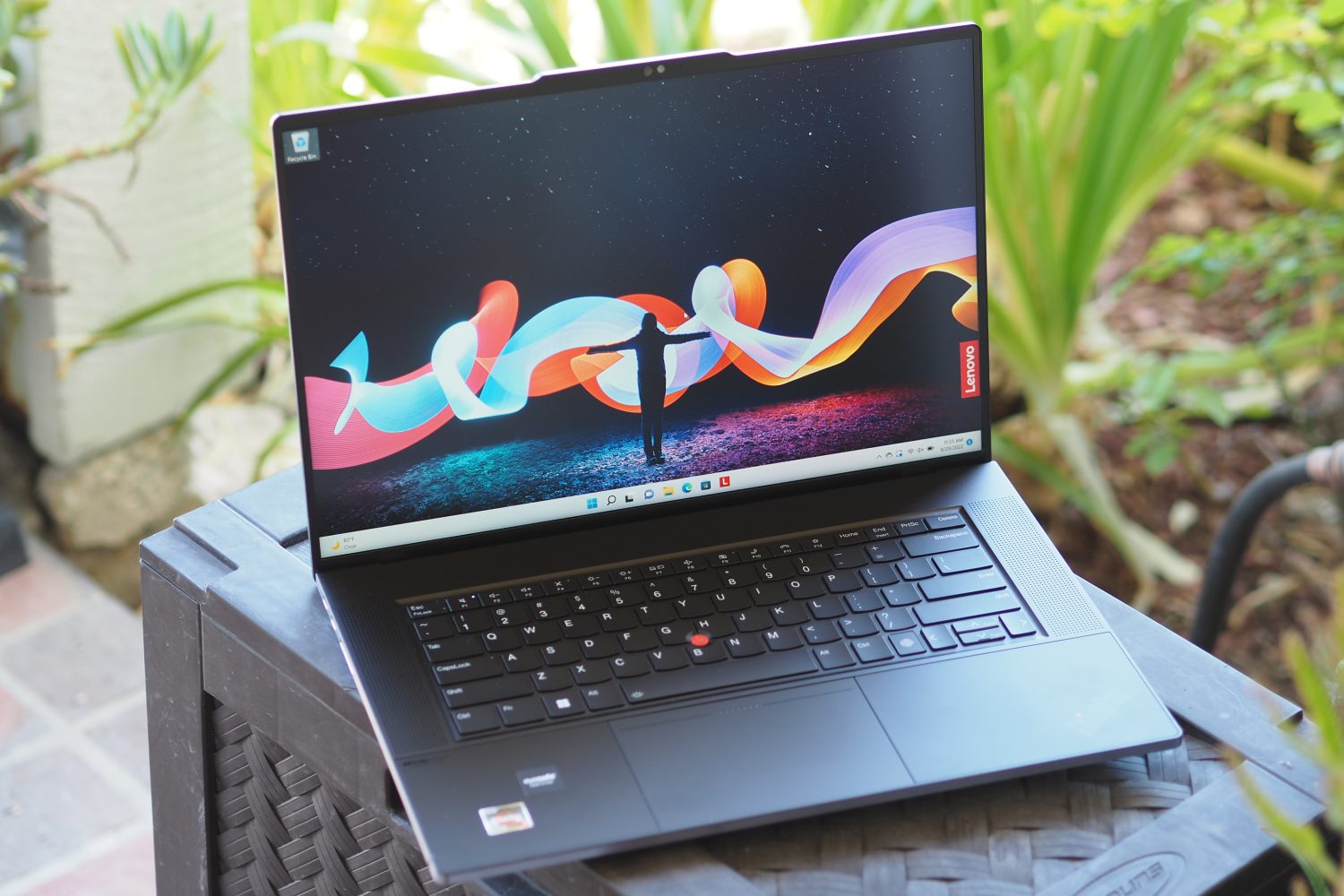
Lenovo has made a concerted effort to construct the ThinkPad Z16 from sustainable materials. That includes 75% post-consumer recycled aluminum in the chassis, 97% recycled plastic in the speaker enclosure and battery, and 90% recycled and/or sustainable materials in the packaging.
That places the device among the leaders in the laptop market, but it doesn’t detract from the machine’s design. The ThinkPad Z16 is just as solid as the rest of the ThinkPad line and as well-built as the best, including the Dell XPS 15 and the Apple MacBook Pro 16.
Despite its all-aluminum chassis, the ThinkPad Z16 is surprisingly light at 3.99 pounds. That’s less than most 15-inch or 16-inch laptops and it’s accomplished without feeling cheap. The laptop’s also thin at just 0.62 inches, which beats the XPS 15 by a considerable margin. It’s a reasonably sized chassis that’s surprisingly comfortable to carry around given the large 16-inch 16:10 display.
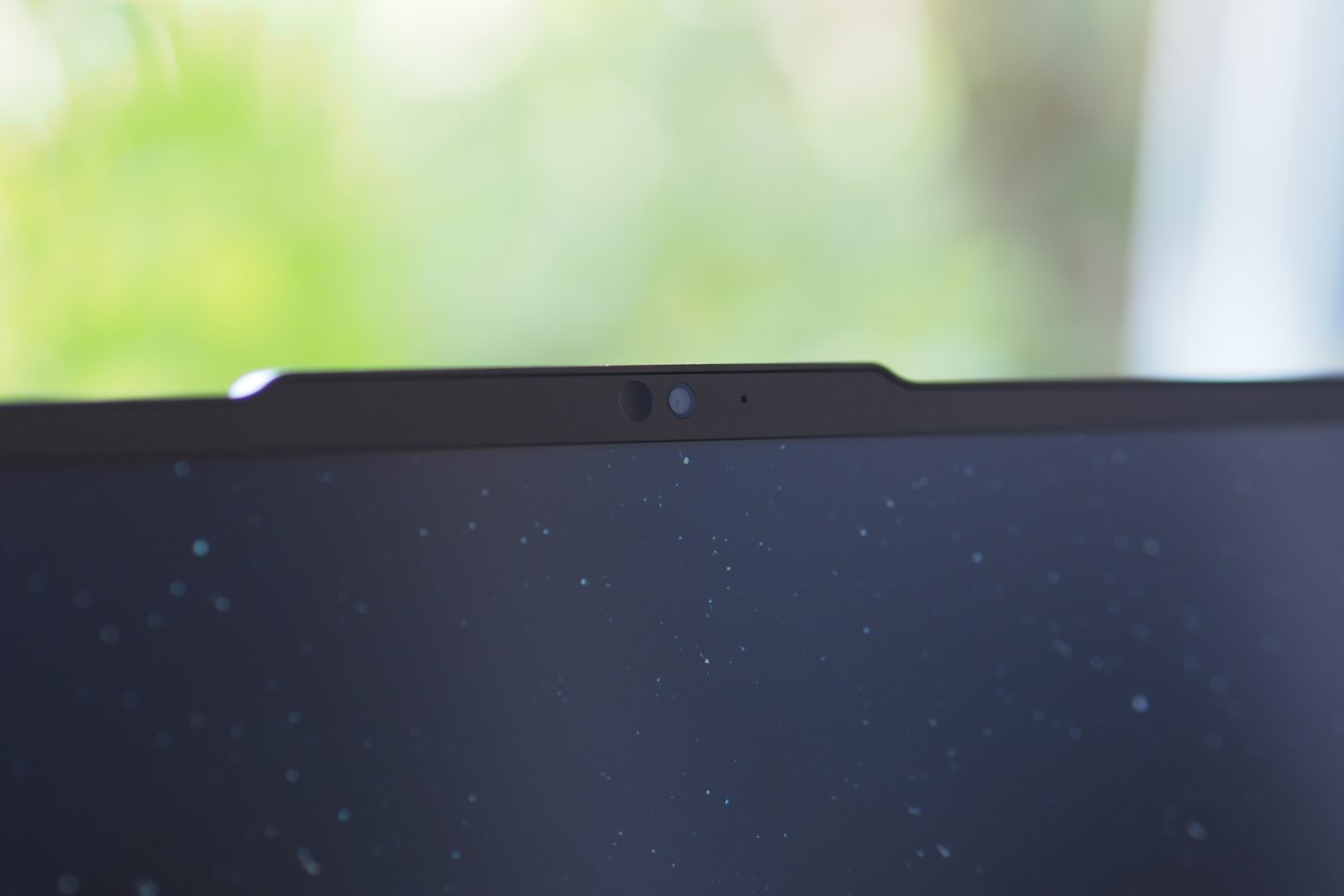
As mentioned above, the ThinkPad Z16 doesn’t look a lot like a ThinkPad, especially with the lid closed. On the outside, it’s a dark silver color with lines that are reminiscent of Dell’s lineup. The traditional ThinkPad logo adorns the lid with an LED light behind the dot on the “i,” but otherwise the aesthetic is more in line with the typical laptop.
Open the lid and you’ll find a black palm rest with a red TrackPoint nubbin in the center of the keyboard, along with a subdued ThinkPad logo in the corner. But even the usual TrackPoint buttons are missing, with the top layer of the haptic touchpad, or “ForcePad,” devoted to the input device.
That’s not a knock against the laptop. It’s an attractive machine, for sure, and even the inverted notch at the top of the display gives it some panache. That notch, dubbed the Communications Bar, houses a high-quality 1080p webcam with infrared and dual-array microphones, and along with small bezels contributes to the highest screen-to-body ratio in a ThinkPad at 92.3%.
Once again there’s an XPS 15 vibe when viewed from straight on, although the bezels are lined with plastic that detracts from the modern look. The notch also provides something to grab onto when opening the lid, which the hinge allows you to do with one hand.
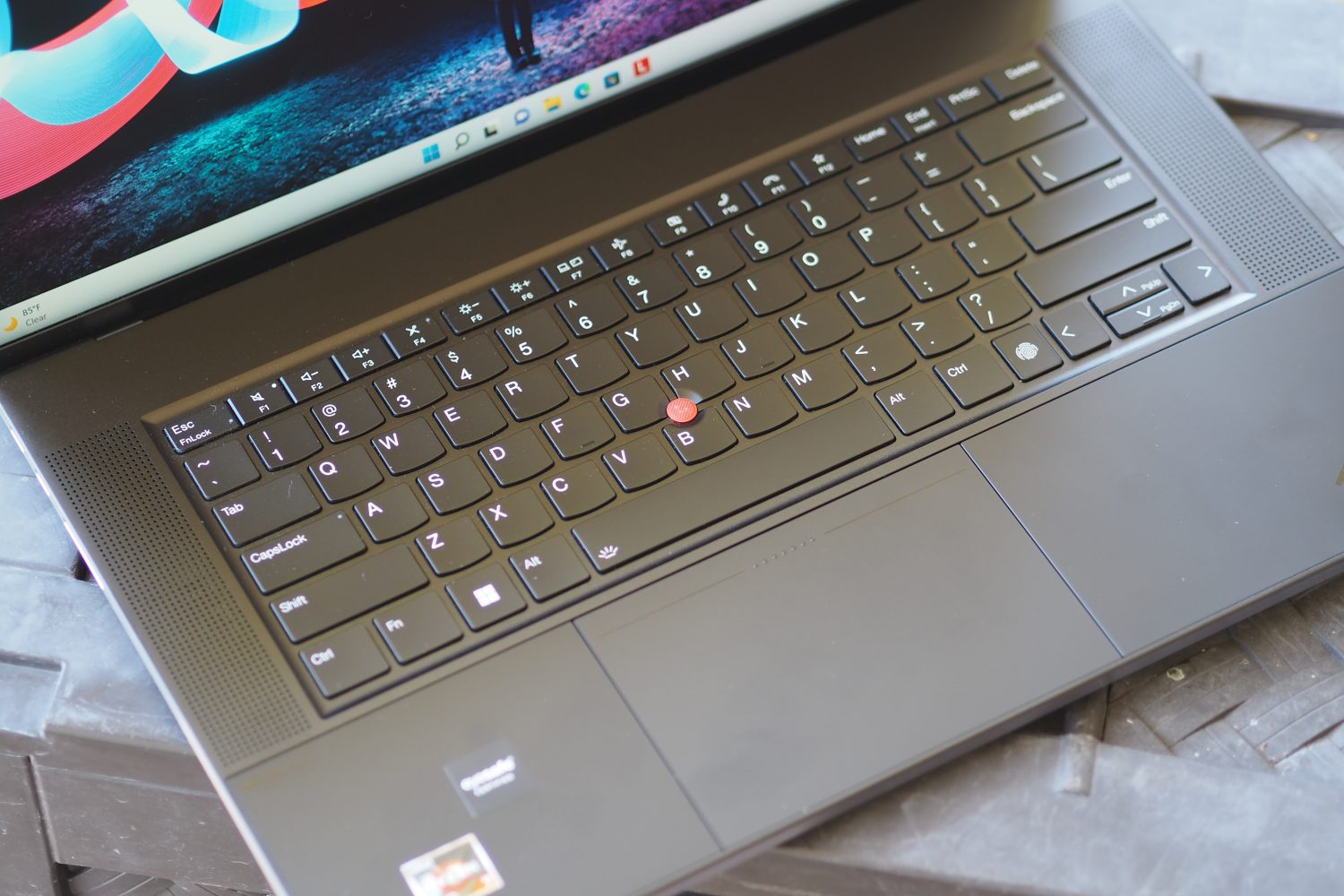
To my eye, the ThinkPad Z16’s keyboard is a mix between the heavily sculpted ThinkPad version and the one you’ll find on other Lenovo brands. It’s a large keyboard with nicely sized keys, and its switch mechanism feels like the one on other ThinkPads with a lighter touch and a snappy feel. It’s an excellent keyboard that ranks up there with the best you find on Windows laptops.
The large ForcePad haptic touchpad is smooth and provides a realistic click across its entire surface. As mentioned above, the top layer mimics the TrackPoint nubbin’s three buttons, and the TrackPoint itself works as well as always for those ThinkPad fans who prefer it.
Connectivity is a bit light for a large laptop. There are two USB-C 4.0 ports, a single USB-C 3.2 Gen 2 port, a 3.5mm headphone jack, and a full-size SD card reader.
I’m used to seeing HDMI and USB-A ports on a 16-inch machine, so those are missing, and then this is an AMD chipset and so there’s no Thunderbolt 4 support. Wireless connectivity is up to date, though, with Wi-Fi 6E and Bluetooth 5.2.
AMD inside means solid performance and superior longevity
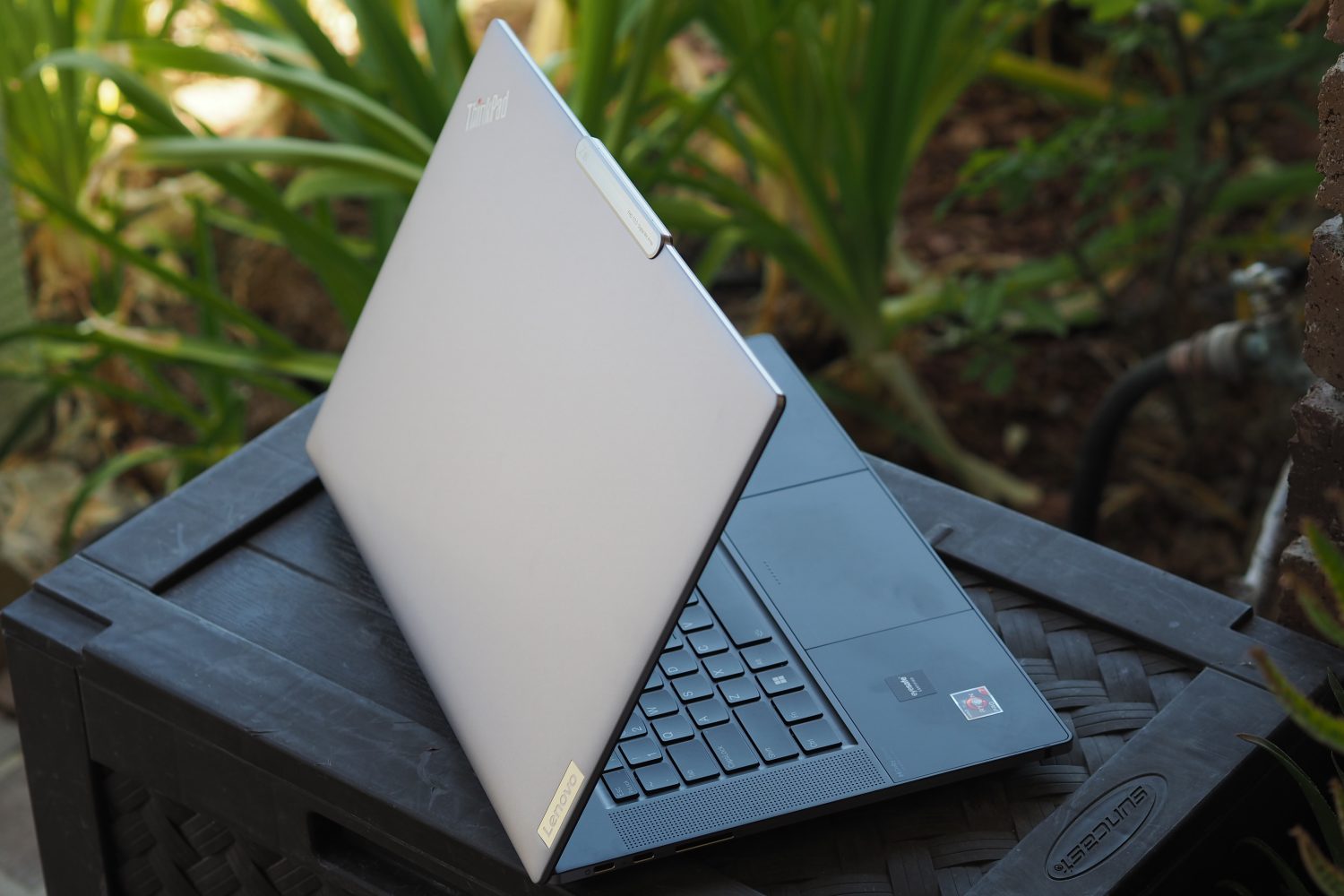
AMD isn’t new to Lenovo’s lineup, but it’s not as common in a ThinkPad. The ThinkPad Z16 uses AMD’s Ryzen Pro chip, which adds additional security features in line with the line’s business focus. Speaking of that, you’ll find the usual self-healing BIOS, Match-On-Chip fingerprint reader (located as a keyboard button), and webcam shutter (an electronic version). I reviewed the AMD Ryzen 7 Pro 6850H configuration, which is an eight-core/16-thread CPU running at 45 watts and up to 4.75GHz. Mine was limited to integrated AMD Radeon Graphics, but there’s an option for the faster discrete AMD Radeon RX 6500 GPU.
The ThinkPad Z16 was a solid performer in our benchmark suite, keeping up with the Dell XPS 15 running Intel’s Core i7-12700H CPU and the Lenovo Slim 7 Pro X with an AMD Ryzen 9 6900HS. The Radeon Graphics limits performance in creative apps that can utilize a discrete GPS, but the laptop can handle demanding productivity workflows and moderate creativity tasks.
It did well in the 3DMark Time Spy test and hit 30 frames per second (fps) in Fortnite at 1200p and epic graphics, faster than Intel’s integrated Iris Xe graphics and competitive with some machines running Nvidia’s GeForce RTX 3050. That makes it a passable entry-level gaming laptop.
| Geekbench (single / multi) |
Handbrake (seconds) |
Cinebench R23 (single / multi) |
PCMark 10 Complete |
|
| Lenovo ThinkPad Z16 (Ryzen 7 Pro 6850H) |
Bal: 1,360 / 8,648 Perf: 1,365 / 8,679 |
Bal: 88 Perf: 87 |
Bal: 1,376 / 10,938 Perf: 1,374 / 11,553 |
6,260 |
| Dell XPS 15 9520 (Core i7-12700H) |
Bal: 1,470 / 9,952 Perf: 1,714 / 11,053 |
Bal: 100 Perf: 77 |
Bal: 1,509 / 11,578 Perf: 1,806 / 13,313 |
5,559 |
| Lenovo Slim 7 Pro X (Ryzen 9 6900HS) |
Bal: 1,493 / 8,914 Perf: 1,493 / 9,288 |
Bal: 99 Perf: 86 |
Bal: 1,552 / 12,139 Perf: 1,548 / 13,164 |
6,493 |
| Asus ZenBook Pro 14 Duo (Core i7-12700H) |
Bal: 1,829 / 10,819 Perf: N/A |
Bal: 94 Perf: 82 |
Bal: 1,793 / 12,046 Perf: N/A |
6,242 |
| LG Gram 16 2-in-1 (Core i7-1260P) |
Bal: 1,682 / 9,035 Perf: 1,686 / 9,479 |
Bal: 137 Perf: 113 |
Bal: 1,524 / 6,314 Perf: 1,663 / 8,396 |
5,404 |
| Asus Zenbook S 13 OLED (Ryzen 7 6800U) |
Bal: 1,417 / 6,854 Perf: 1,404 / 7,223 |
Bal: 112 Perf: 111 |
Bal: 1,402 / 8,682 Perf: 1,409 / 8,860 |
5,647 |
AMD’s Ryzen chips tend to be more efficient than their Intel equivalents, and that’s on display with the ThinkPad Z16. Despite just 72 watt-hours of battery capacity, which is light for a 16-inch laptop, and with a large 16-inch display, the ThinkPad still managed an above-average result in our web browsing test and a spectacular score in our video test.
It’s stronger than the XPS 15 and the rest of our comparison group, and virtually guarantees a full day of battery life with typical productivity tasks. Like several AMD machines I’ve reviewed, the ThinkPad Z16 wouldn’t complete the PCMark 10 Applications battery test.
| Web browsing | Video | |
| Lenovo ThinkPad Z16 (Ryzen 7 Pro 6850H) |
12 hours, 4 minutes | 23 hours, 2 minutes |
| Dell XPS 15 9520 (Core i7-12700H) |
9 hours, 38 minutes | 12 hours, 40 minutes |
| Lenovo Slim 7 Pro X Ryzen 9 6900HS) |
7 hours, 49 minutes | 11 hours, 30 minutes |
| Asus ZenBook Pro 14 Duo (Core i7-12700H) |
3 hours, 10 minutes | 5 hours, 18 minutes |
| LG Gram 16 2-in-1 (Core i7-1260P) |
11 hours, 31 minutes | 17 hours, 58 minutes |
Speaking of battery life, my ThinkPad Z16 review machine equipped a low-power 1,920 x 1,200 IPS non-touch display, which likely contributed to the laptop’s longevity. The display offered average colors and accuracy for a premium display, with an excellent 485 nits of brightness and high contrast for an IPS display at 1,520:1. If you’re a creator who craves excellent colors and even deeper contrast, you’ll want to opt for the 3,840 x 2,400 OLED panel.
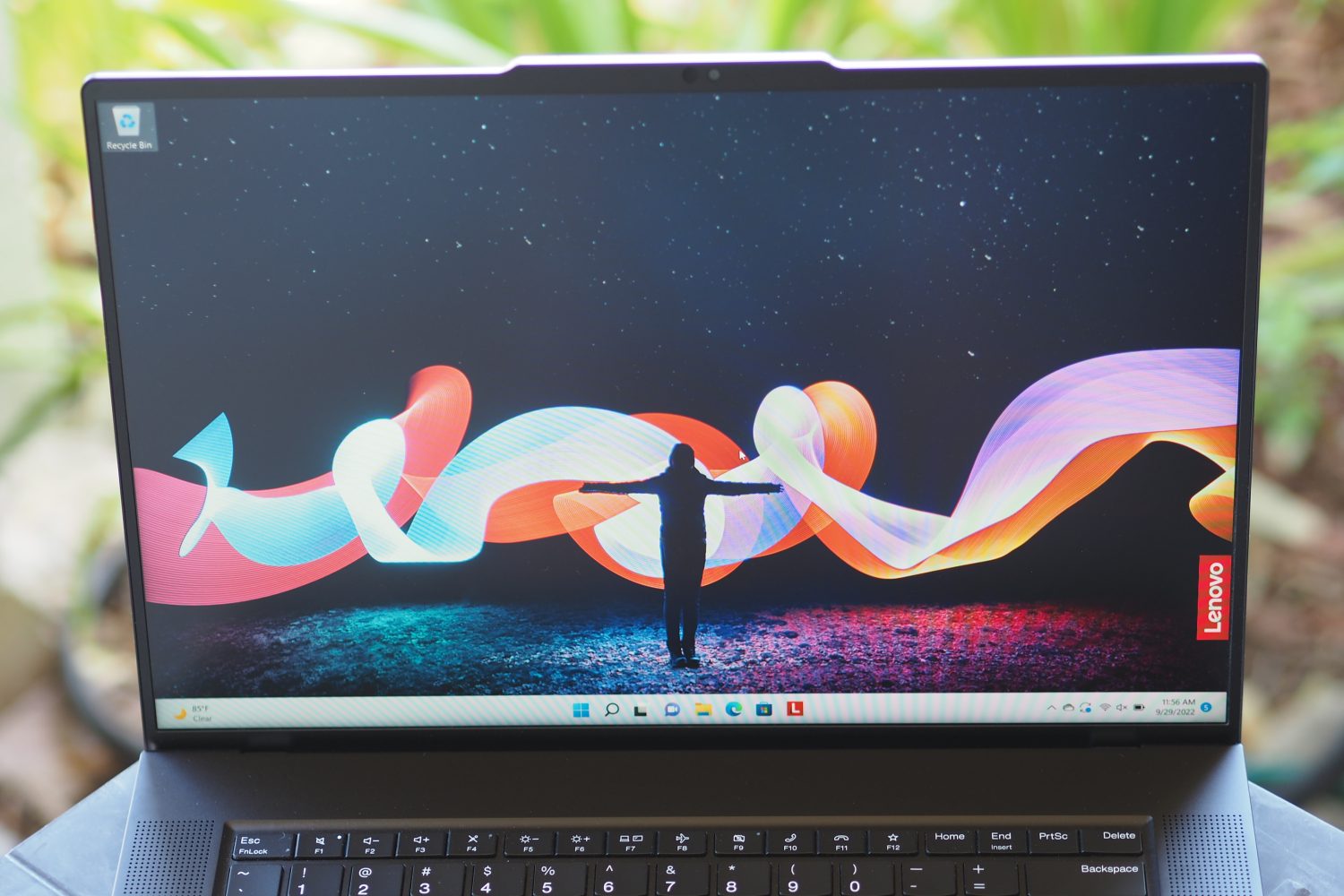
Dual speakers provide passable sound that’s nowhere near the quality of the XPS 15’s quad speakers. The volume gets quite loud and mids and highs are fine, but there’s not a ton of bass.
A ThinkPad that’s not a ThinkPad, and that’s okay
The Thinkpad Z16 breaks out of the typical ThinkPad mode and introduces a new, more contemporary machine to the line. It proves that Lenovo is willing to take some risks, and it was worth it. The ThinkPad Z16 is a well-built, attractive, fast, and long-lasting laptop with an excellent keyboard and haptic touchpad.
The biggest problem with the machine is that it’s expensive. I wish the same principles that Lenovo applied to the smaller ThinkPad Z13 could apply here. But even then, it’s in line with laptops like the Dell XPS 15 and the Lenovo ThinkPad X1 Extreme, and it costs less than more powerful laptops like the MSI Creator Z16P and the MacBook Pro 16. The ThinkPad Z16 is worth a look if you’re in the market for a larger machine.
Editors’ Recommendations


